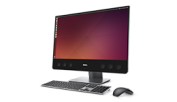It was five years ago today, on November 29, 2012, that the first Project Sputnik system was launched. Who would have thought we would have made it this far.
The reason why Project Sputnik is not only still around but keeps growing is because of the developer community.
In fact, without the input and support of the community, Project Sputnik would have been an interesting idea that disappeared after six months.
So how did we get here?
In the beginning
The project began back in early 2012 when I pitched the idea of creating a Linux-based developer laptop. My audience was three guys in Dell who had put together an innovation fund and were asking employees to bring them their ideas.
When I made my pitch I stressed that in order to be successful, equally as important as what we created, was how we created it. Development of the system needed to be in the open, and based on input directly from the developer community. The committee asked me a few questions and told me they’d get back to me.
Ready, set, go
A month later I heard back from the committee. They had given me the thumbs up, a little pot of money and six months to see if the idea of a developer laptop would fly. From there I recruited some top and passionate talent and we had ourselves a team.
We started by cobbling together an initial install image that people could test. In parallel we also sanity checked the idea with a local developers and a couple of web companies. Since nobody threw up on the idea, on May 7, 2012 we went public.
The power of the community
In the blog post that introduced Project Sputnik we explained that project was “a six month effort to explore the possibility of creating an open source laptop targeted directly at developers.” We pointed people at our rough install image and asked them to head to the Storm Session we had created and submit feedback, comments and ideas.
The amount of interest and input our initial post generated far exceeded anything we expected. From there interest kept growing. The tipping point however, came in response to our beta program. We asked interested individuals to submit an online form. We expected a few hundred responses, we got over 6,000. Senior management was convinced and from there it was the march to launch.
Lift off and beyond
On November 29, 2012, a little over 6 months after the initial blog post, the first XPS 13 developer edition became available. This first system, which came preloaded with Ubuntu 12.04 LTS and 1 year pro support, was available only as one configuration. We chose to go with the highest end config we offered: 3rd gen Intel core i7 (Ivy Bridge), 8GB RAM, 256GB SSD and a screen resolution of 1366×768.
Less than two months later the second generation XPS 13 developer edition was launched. From there the line has continued to grow and grow (see timeline below). We will soon be introducing the 7th generation XPS 13 developer edition and over this past year we have rolled out four Ubuntu-based Precision mobile workstations as well as the new Precision All in One.
Thank you
On behalf of myself and the whole Sputnik team we would like to thank the developer community for making project Sputnik possible. Over the last five years you have let us know what you’ve liked and where we could do better. It’s because of this amazing support that we are still here today.
Thank you!
Project timeline
2012
- Project Sputnik announced — May 7, 2012
- Project Sputnik to go from Pilot to Product — July 18, 2012
- 1st gen Dell XPS 13 developer edition in the US — November 29, 2012
2013
- 2nd gen developer edition in US and Europe — February 18, 2013
- 3rd gen developer edition in US along with instructions on getting Ubuntu up and running on a Precision 3800 mobile workstation — November 15, 2013
- 3rd gen developer edition in US and Europe — December 20, 2013
2015
- Dell Precision M3800 mobile workstation joins Project Sputnik — January 27, 2015
- 4th gen Dell XPS 13 developer edition in US and Europe — April 9, 2015
2016
- 5th gen XPS 13 Developer Edition in US, Ubuntu-based Workstations (5510, 3510, 7510, 7720) available worldwide — March 3, 2016
- 5th gen XPS 13 developer edition in Europe — March 31, 2016
- 6th gen XPS 13 Developer Edition in Europe and US — October 04, 2016
2017
- Next gen Ubuntu-based Precision line-up announced, 5520 and 3520 available — January 9, 2017
- Precision 7520 and 7720 available — March 18, 2017
- Precision All-in-One available — April 18, 2017
2018
- 7th gen XPS 13 developer edition to become available
Extra-credit reading
- Original input from the community with regards to what they wanted in a developer laptop – Dell Idea Storm
- Dell, Developers & Desktop Linux: the story of Dell’s project Sputnik – Video interview
- How Dell’s Project Sputnik came to life – CIO.com
- Project Sputnik News & Reviews, 2012 – 2017
Pau for now…
[…] bien, el Proyecto Sputnik cumple cinco años en estas fechas, tal y como nos recuerda su principal impulsor, Barton George, en las páginas de […]
LikeLike
Hi Barton,
Any word on being able to neuter the Intel ME stuff? Certain lines from Dell allow you to customize the order by making ME inoperable. Reported in many places. See here: http://www.linux-magazine.com/Online/News/Dell-to-Disable-Intel-s-Insecure-IME for instance. I’m sure the Ubuntu/Linux loving crowd would overwhelmingly like this. Otherwise people will flock to competitor brands that claim to care about user security like Puri.sm and System 76
LikeLike
Hi Anthony,
Im sorry its taken so long to respond. Here is Dell’s official communication around IME http://www.dell.com/support/article/us/en/04/sln308237/dell-client-statement-on-intel-me-txe-advisory-intel-sa-00086-?lang=en. This doc talks about what we’re doing to update affected platforms and includes firmware and BIOS relates to address the IME vulnerabilities
LikeLike
[…] Project Sputnik Turns Five! – November 29, 2017 […]
LikeLike
[…] and it, along with the Ubuntu-based Precision mobile workstations that launched in 2015, make up Project Sputnik. In case you’re not familiar with it, Project Sputnik is Dell’s skunkworks initiative […]
LikeLike